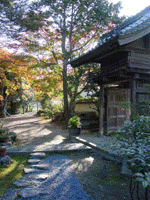|
|
|
|
|
|
|
|
|
|
||||||||||
|
|
||||||||||
|
|
Concept & Program
Living Arts
Usually, when one visits a foreign country, one mostly sees places and objects: temples and museums. Maybe a festival if one is lucky. Or perhaps one hears someone give a talk or illustrated lecture. But the hardest thing to gain true understanding of are the living arts based on ancient philosophies such as Zen or Shinto: tea ceremony, dance, music, flower arrangement, martial arts. They exist only in the bodies and minds of their practitioners and leave nothing behind. But it is in these arts that the spiritual origins of the culture are revealed.
Physical works such as paintings, sculptures, and architecture are of course an important part of cultural heritage. However, Origin focuses mostly on "arts of living and practice". Only when one has understood these, do the paintings and other art works start to make sense.
For this reason we recommend that travelers take the Origin program as early in their trip as possible. Origin provides the mental tools for travelers to fully understand and enjoy what they will be later seeing as they visit temples, palaces, and villages.
Traditional Arts for Modern People
The problem in countries such as Japan and Thailand is that it's very difficult for foreigners (and also young people from those countries) to access the traditional arts.
At the low end of the scale are the ubiquitous "tourist shows" in which case the spiritual values are degraded. Higher up are "demonstrations" of arts or dance, but these usually lack a context or explanation to make them truly understandable. And at the top end are the orthodox traditions preserved in universities or palaces – which are mostly closed to outsiders.
Another problem is that generally the teachers of traditional arts in Asia are used to teaching only to students who are going to dedicate their lives to the art form. But most modern people are not going to do that. They seek to learn something of value In the arts, but after that they must return to their everyday lives. So far there have been no programs aimed at this need.
It's the purpose of Origin to fill this gap. We introduce traditional arts in a way that's true to the high tradition – that can be experienced in a short period of time – and in a way that's understandable to modern people.
Types of Programs
Two Day Program
This is the ideal program for people who have time to do it, because in these two days we have time to introduce the four core arts, as well as additional arts (such as ceramics). And it allows plenty of time for orientation and question and answer sessions.
One Day Program
Many visitors only have time for a one- program, in which case we focus on the core arts. We've devised a streamlined program which introduces participants to critical ideals of the traditional culture.
One Week Program
Working with individuals or tour groups, we offer a comprehensive one-week program. It begins with a one or two day program of arts in Bangkok, followed by visits to selected sites in and around Bangkok (some of which are not open to the public), with explanation by Alex Kerr and other experts.
In the second half, participants go up to Chiangmai, where they experience the Chiangmai program for one or two days, along with visits to cultural sites in the Chiangmai area.
The week culminates in a gala dinner event in Chiangmai (see Final Party)
Options
We tailor each Origin program to the individuals or tour groups who participate. Among the many options are: Kyoto Events & Party , Bangkok Events , Chiangmai Events
Events & Party for Art Programs
Ideally, each Origin program should end with a final party, in which participants see the dance, music, flowers, textiles, etc that they have learned, put together in a beautiful and authentic context. For example, having learned the hand and foot motions of dance in the program, they now see professional dancers, dressed in gorgeous gold and brocade costumes and wearing masks, perform a full classic dance. Likewise they eat food and desserts cooked as they have seen in class; in a room decorated with flowers such as they have made, and so forth. The final dinner is a valuable – and really fun – way to bring it all together.
Tours of Cultural Sites
For groups who have time, we can also design tours of carefully selected cultural sites (some of which may not be open to the general public). Alex Kerr or other experts would accompany the group and provide historical and artistic explanation.
Origin for Japanese visitors
Because of the link with Japan and Kyoto, Origin is uniquely situated to offer programs for Japanese visitors, with all classes translated in Japanese.
|
|
|
|
|
|


